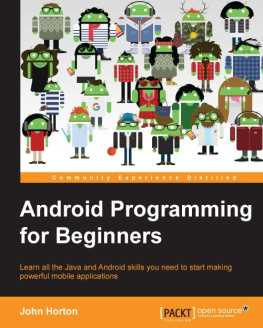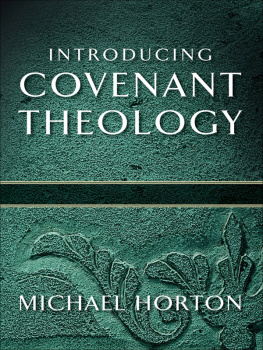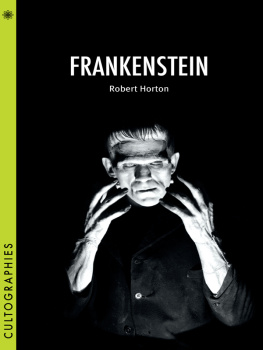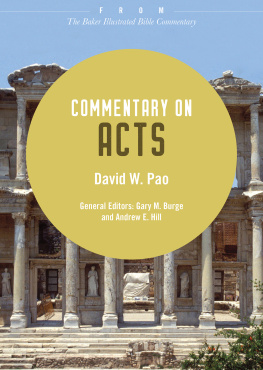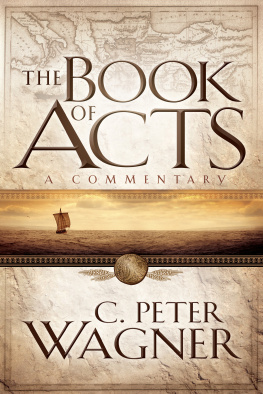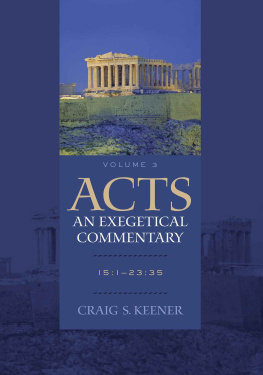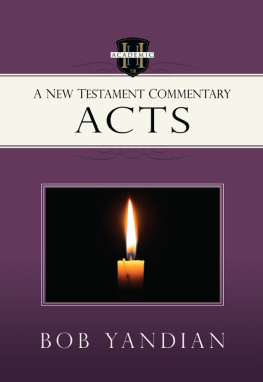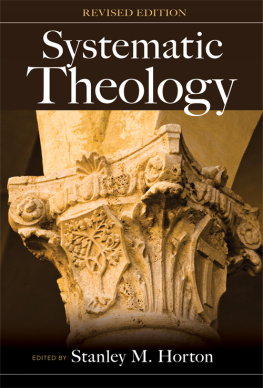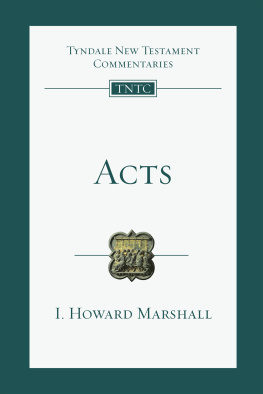Horton - Acts: A Logion Press Commentary
Here you can read online Horton - Acts: A Logion Press Commentary full text of the book (entire story) in english for free. Download pdf and epub, get meaning, cover and reviews about this ebook. year: 2012, publisher: BookMasters, genre: Religion. Description of the work, (preface) as well as reviews are available. Best literature library LitArk.com created for fans of good reading and offers a wide selection of genres:
Romance novel
Science fiction
Adventure
Detective
Science
History
Home and family
Prose
Art
Politics
Computer
Non-fiction
Religion
Business
Children
Humor
Choose a favorite category and find really read worthwhile books. Enjoy immersion in the world of imagination, feel the emotions of the characters or learn something new for yourself, make an fascinating discovery.

Acts: A Logion Press Commentary: summary, description and annotation
We offer to read an annotation, description, summary or preface (depends on what the author of the book "Acts: A Logion Press Commentary" wrote himself). If you haven't found the necessary information about the book — write in the comments, we will try to find it.
Horton: author's other books
Who wrote Acts: A Logion Press Commentary? Find out the surname, the name of the author of the book and a list of all author's works by series.
Acts: A Logion Press Commentary — read online for free the complete book (whole text) full work
Below is the text of the book, divided by pages. System saving the place of the last page read, allows you to conveniently read the book "Acts: A Logion Press Commentary" online for free, without having to search again every time where you left off. Put a bookmark, and you can go to the page where you finished reading at any time.
Font size:
Interval:
Bookmark:
ACTS
A Logion Press Commentary
Stanley M. Horton
ISBN: 978-1-60731-118-8

Springfield, Missouri
This book is a revised and expanded edition of The Book of Acts, 1981 by Gospel Publishing House.
All Scripture quotations, unless otherwise indicated, are taken from the HOLY BIBLE: NEW INTERNATIONAL VERSION. NIV. Copyright 1973, 1978, 1984 by International Bible Society. Used by permission of Zondervan. All rights reserved.
Scripture quotations marked (NASB) are taken from the New American Standard Bible, Copyright 1960, 1962, 1963, 1968, 1971, 1972, 1973, 1975, 1977, 1995 by The Lockman Foundation Used by permission. (www.Lockman.org)
Scripture quotations marked (NLT) are taken from the Holy Bible, New Living Translation, copyright 1996. Used by permission of Tyndale House Publishers, Inc., Wheaton, Illinois 60189. All rights reserved.
Scripture quotations marked (NKJV) are taken from the New King James Version. Copyright 1982 by Thomas Nelson, Inc. Used by permission. All rights reserved.
2001 by Gospel Publishing House, 1445 N. Boonville Ave., Springfield, Missouri 65802. All rights reserved. No part of this book may be reproduced, stored in a retrieval system, or transmitted in any form or by any meanselectronic, mechanical, photocopy, recording, or otherwisewithout prior written permission of the copyright owner, except brief quotations used in connection with reviews in magazines or newspapers.
Logion Press books are published by Gospel Publishing House.
Library of Congress Cataloging-in-Publication Data
Horton, Stanley M.
Acts: a Logion Press commentary / Stanley M. Horton.
p. cm.
Rev. ed. of: The book of Acts. 1981.
Includes bibliographical references and indexes.
ISBN 0-88243-304-0
1. Bible. N.T. ActsCommentaries. I. Horton, Stanley M.
Book of Acts. II. Title.
BS2625.3 H66 2001
226.6077dc21
2001034223
CONTENTS
The Early Church of the Book of Acts is a model for the Pentecostal church of the twenty-first century. In Acts students discover the ingredients that caused the Early Church to grow and become a powerful force to affect their society. They were a people of prayer, the Word, fellowship, evangelism, and discipleship. They were committed to spreading the good news about Jesus. No wonder the Lord added to their number daily those who were being saved ( Acts 2:47 ).
The growth of the Pentecostal and charismatic movement in recent years has encouraged many to turn to the Book of Acts, and their study has become an adventure in discovery. Many of the recent commentaries, however, look at the book from an anti-Pentecostal stance. Their authors have distanced themselves from the Pentecostal experience. They forget that Luke, the apostles, and all the early believers in Christ were Pentecostal. There is strong evidence that speaking in tongues and other gifts of the Spirit continued into the second and third centuries A.D. and only gradually died out. Revivals over the centuries brought refreshing restoration of the gifts. The past century has seen one of the greatest revivals and spread of the gospel in all of church history. The author of this commentary, Dr. Stanley M. Horton, writes from the perspective of one who has experienced the power and blessing of the Pentecostal revival.
Dr. Horton comes from a Pentecostal heritage where his grandmother was baptized in the Spirit in 1880 and his mother and father were baptized in the Spirit in 1906. He brings to this book insights from forty-six years of teaching in the seminary and colleges of the Assemblies of God. As a guest professor he has also observed the work of the Spirit in Canada, Ireland, Belgium, Germany, Lithuania, Russia, Kenya, Israel, Brazil, Singapore, and Korea. Other experiences of Dr. Horton include an archaeological dig at Dothan.
Dr. Hortons scholarship is unquestioned and thoroughly Pentecostal. He does not compromise his loyalty to Scripture as the infallible Word of God, inspired by the Holy Spirit. Students will find explanations in this verse-by-verse commentary that will encourage their faith and challenge them to proclaim the gospel in the power of the Holy Spirit. May you also apply its truths to practical Christian living. I highly commend this book to you.
Thomas E. Trask
General Superintendent
General Council of the Assemblies of God
The growth of the Pentecostal and charismatic movements has directed new attention to the Book of Acts. Many scholarly works have appeared since I wrote the first edition of this commentary in 1981. Most of them, however, neglect or bypass the Pentecostal distinctives that characterize Acts. I have taken note of recent literature and have sought to bring out what the Bible teaches.
In quoted Scripture, words I wish to emphasize are highlighted with italics.
For easier reading, Hebrew, Aramaic, and Greek words are all transliterated with English letters.
These abbreviations have been used:
Gk.: Greek
Heb.: Hebrew
Lat.: Latin
Beck: William F. Beck, The New Testament in the Language of Today
CEV: Contemporary English Version
JB: Jerusalem Bible
KJV: King James Version
NASB: New American Standard Bible
NCV: New Century Version
NEB: The New English Bible
NIV: New International Version
NKJV: New King James Version
NLT: New Living Translation
NRSV: New Revised Standard Version
Phillips: J. B. Phillips, The New Testament in Modern English
RSV: Revised Standard Version
TEV: Todays English Version
LXX: Septuagint
Acts: Greek Text: F. F. Bruce, The Acts of the Apostles: The Greek Text with Introduction and Commentary, 3d ed.
My special thanks go to Dr. Waverly Nunnally, Jr., Professor in Early Judaism and Christian Origins, Chair of Division of Biblical Education at Central Bible College, for reading the manuscript and making many valuable suggestions. Special thanks also to Glen Ellard, Paul Zinter, and Leta Sapp at Gospel Publishing House and to all who assisted in preparing this book. Thanks also to my wife, Evelyn, and to Dr. Dayton Kingsriter and the Pentecostal Textbooks Project Board for their encouragement.
The Book of Acts is special. No other book in the Bible is like it. Although there are historical books in the Old Testament, they emphasize the failures, the sins, and the idolatry that kept Gods people from the fullness of His blessing.
In the Book of Acts, that failure is in the past. Israel has learned its lesson, and idolatry is no longer a problem among them. More importantly, Jesus has come. His death on Calvary has put the new covenant into effect ( Heb. 9:15 ). By His resurrection He has brought blessing and great joy to His followers ( Luke 24:5152 ). A sense of both fulfillment and anticipation pervades the book.
Originally the book had no title. Since the middle of the second century A.D., however, it has been known as The Acts of the Apostles. Peter alone is prominent in the first part of the book; Paul alone is prominent in the latter part.
Actually, the Holy Spirit is more prominent than the apostles, though they have a place of honor. The book records how Jesus himself focused attention on the Holy Spirit ( Acts 1:45 ). The outpouring of the Spirit ( 2:4 ) then sets the action of the book in motion. Acts mentions or refers to the Spirit fifty-one times. Consequently, many have suggested that The Acts of the Holy Spirit would be a better title.
However, the content of Acts is much broader. The churches in Galilee and Samaria are given very little attention ( 9:31 ). Important events such as the growth of a strong church in Egypt or even Rome during the first century are not even mentioned. On the other hand, some events are given in great detail (see chaps. ; ; ; and ).
Next pageFont size:
Interval:
Bookmark:
Similar books «Acts: A Logion Press Commentary»
Look at similar books to Acts: A Logion Press Commentary. We have selected literature similar in name and meaning in the hope of providing readers with more options to find new, interesting, not yet read works.
Discussion, reviews of the book Acts: A Logion Press Commentary and just readers' own opinions. Leave your comments, write what you think about the work, its meaning or the main characters. Specify what exactly you liked and what you didn't like, and why you think so.

